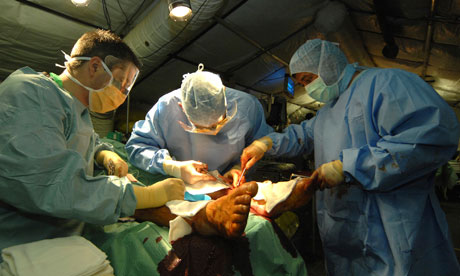 |
Blood-clotting drug given to wounded soldiers can cause heart attacksTrials of NovoSeven, used to halt blood loss, suggest it is no more effective than placebo and raises risk of clots in arteries • Ian Sample, science correspondent
The Ministry of Defence says NovoSeven is used as a 'medicine of last resort' when all other attempts to stem bleeding have failed. Photograph: Reuters A drug given to wounded soldiers in Iraq and Afghanistan may be putting their lives in further danger by causing heart attacks and strokes. The treatment is used to stop serious bleeding in injured troops, but trials show the drug increases the risk of blood clots forming in arteries, which can kill or cause complications that result in amputation. The dangerous side effects are all the more concerning because years of trials have yet to prove the drug is any better at saving the lives of injured soldiers than a placebo. The drug, called NovoSeven, was licensed more than a decade ago to stop bleeding in haemophiliacs, but is used by military doctors and in civilian hospitals on an "off-label" basis to treat patients suffering from major blood loss due to trauma or surgery. The drug, also known as recombinant factor seven, costs several thousand pounds per patient but an effective alternative called tranexamic acid costs just £5 per patient. A spokesman for the Ministry of Defence confirmed that NovoSeven was used by UK forces as "a medicine of last resort", when all other attempts to stem bleeding had failed. The US military also uses the drug. Prof Ian Roberts, an expert in trauma care at the London School of Hygiene and Tropical Medicine, warned in 2006 that NovoSeven was being used off-label before trials had clarified whether or not it helped save lives. "There are both civilian patients and wounded soldiers who will have been given this drug and the best evidence shows they would not have benefited, but would have experienced heart attacks, strokes and possible amputations," Roberts said. By continuing to use the drug, the military and hospital surgeons were leaving themselves vulnerable to legal action, he added. "You cannot defend giving this treatment outside of a randomised controlled trial," he said. He added that the US military, which has used NovoSeven for years, should explain why it embraced the drug. "What advice were they acting on? Was the advice they received truly independent, or were people compromised in any way? It is important to know," he said. Dr Mads Krogsgaard Thomsen, chief science officer at Novo Nordisk, the Danish company that makes NovoSeven, said the drug posed very low risk when used under licence to stop bleeding in haemophiliacs and for certain rare blood clotting disorders. "We cannot encourage as a company, by any means, the off-label use of NovoSeven. This is not something we are promoting and it is not something we are responsible for." Thomsen estimates that between 10% and 20% of NovoSeven is used off-label. "Every now and then, physicians do use it as a last resort in patients that are otherwise likely to die," he said. Roberts believes the case for using NovoSeven is weakened further by the availability of a much cheaper alternative drug, tranexamic acid, which is known to save lives in bleeding patients without dangerous side effects. A trial of tranexamic acid, called Crash-2, was published in the Lancet in June. Marcel Levi, professor of internal medicine at Amsterdam Medical Centre, published a review of NovoSeven trials in the New England Journal of Medicine last week that was funded by NovoNordisk. "If you look at whether the drug stops bleeding, or whether fewer transfusions are needed, then many studies are positive. If the only thing that matters is mortality, then it is much harder to prove that this is a useful drug," he said. Beverley Hunt, a consultant haematologist who worked on the Crash 2 trial at Guy's and St Thomas's Hospital in London, said: "The issue around the use of factor seven in patients with massive blood loss is that there is a lack of evidence to show us how clinically efficacious it really is, what dose to use and when to use it. The problem with using an agent that alters blood clotting is that it is a tightrope walk in reducing the risk of bleeding without increasing the risk of blood clots. "The recent data showing that its use is associated with a 5% risk of arterial thrombosis means we should not be using it early in the management of massive blood loss. If however despite normal good practice, somebody is bleeding to death and you have nothing left, are you willing to take a 5% risk of arterial thrombosis, and the answer is yes you are." |
||||||||||
